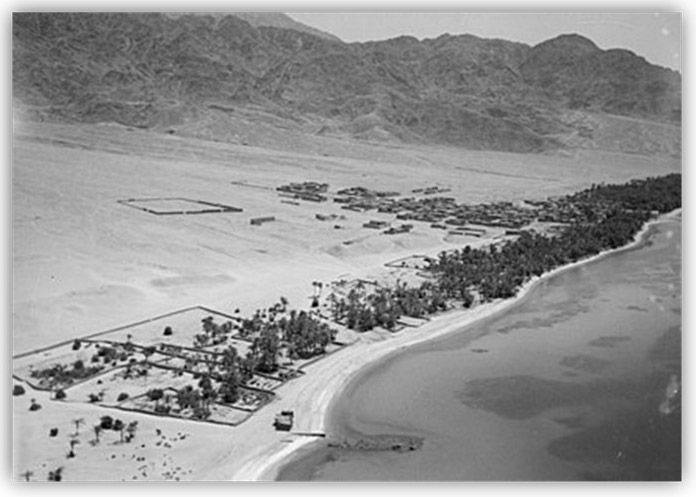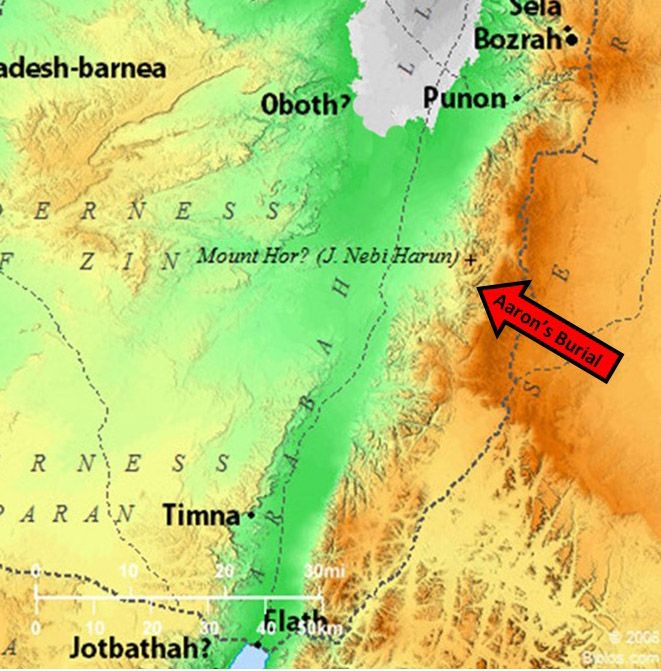Little City, Big History - Part 1

ORIGIN OF THE NAME
You may never have heard of Aqaba, Jordan, before we moved here. Or you could remember it from the 1962 Movie, Lawrence of Arabia. If you’re a devoted Bible student, you might be aware it was known as Etzion Geber (meaning backbone like a man), a place where the children of Israel passed through in their wilderness wanderings and where King Solomon built his country’s ships hundreds of years later. We find the statement in 1 Kings 9:26 (ESV), “King Solomon built a fleet of ships at Ezion Geber (etz-YONE GEH-bare), which is near Eloth (ay-LOTH or ay-LAHTH) on the shore of the Red Sea, in the land of Edom.”
Where is Eloth?
Eloth, which means palm tree grove, is the ancient spelling of modern-day Eilat (ay-LAHT), Israel. Originally Eloth/Eilat was where Aqaba is now. Over the years, this place has changed names: Alath, Ailath, Berenice, Aila, Haila, Ayla, Elyn, Umm Rashrash. The full name of the city today is al-Aqaba, a short form of Aqabat Aylah (the mountain pass of Ayla), first mentioned in the twelfth century. At that time, it was mostly a military stronghold, and the name referred to the mountain pass north of town.[1]
Today, Ayla is a posh area adjoining the western edge of Aqaba right on the water.
It’s a gated community with its own shopping center, restaurants, banking, and marina. A guard stops everyone entering to ask whether they are a resident or what other business they have. Since we have always gone in a taxi, the driver took care of explaining. There has never been a problem for us to enter.
Ayla means “terebinth tree” or “oak tree” (from Hebrew “ela/אֵלָה”), “moonlight,” or “halo (around the moon).” In Scottish, Ayla means “from a strong place.”[2]
The city in Israel across the gulf was only founded in 1952. The Committee for the Designation of Place Names in the Negev named sites in that part of the country after Israel regained the land. They knew Eilat had historically been on the other side of the water, but they wanted to retain the biblical name. At the time, there was only a small adobe hut serving as the British police station. Today, Mall Hayam, the most popular shopping location, stands on the site.[3]
At roughly 200,000, Aqaba’s current population[4] is four times greater than Eilat’s 52,299.[5]Our new hometown’s elevation is only 19.69 feet above sea level, and it occupies 144.8 square miles. Its nickname is “The Bride of the Red Sea.”[6]
A friend of ours pointed out that the Hebrew name Jacob has the same three-letter Hebrew root as the word Aqaba, “a-q-b.” Is there more here than meets the eye?
Strong’s Biblical word numbering system H6117 tells us this about it.
aqab = aw-KAHB
Strong’s Definition - properly to swell out or up; used only as denominative from
{H6119 } to seize by the heel; figuratively to circumvent (as if tripping up the heels); also to restrain (as if holding by the heel)
The only person who said Jacob was a supplanter was Esau. Is it possible, Jacob was grabbing his twin’s heel to prevent Esau from kicking him in the head as they were exiting the womb?
During her pregnancy, the babies were struggling so much, Rebekah prayed to God to ask what in the world was going on. We read in Genesis 25:22-23 (CEV): “Before Rebekah gave birth, she knew she was going to have twins, because she could feel them inside her, fighting each other. She thought, "Why is this happening to me?" Finally, she asked the LORD why her twins were fighting, and he told her: "Your two sons will become two separate nations. The younger of the two will be stronger, and the older son will be his servant."
From that time until today, they have been at odds. That conflict is in play even at this moment.
BIBLE MENTIONS
During the Exodus
The first time the Bible mentions this location is when the Israelites passed through on their way to the promised land. Numbers 33:35-36 (ESV) says, “And they set out from Abronah and camped at Ezion Geber. And they set out from Ezion Geber and camped in the wilderness of Zin (that is, Kadesh).
Moses mentioned it again in Deuteronomy 32:8 (ESV) after he and the Israelites trekked through. “So we went on, away from our brothers, the people of Esau, who live in Seir (say-EER), away from the Arabah road from Elath and Ezion Geber. And we turned and went in the direction of the wilderness of Moab.”
The Bible informs us that the Horites were the first to occupy the area. God gave Esau (aka Edom) their land, so the Edomites destroyed them and lived in their place.

There are only three sources we can pinpoint today from the Bible’s description of the forty-two stops Israel made in the wilderness: Goshen, Ezion Geber, and Mt. Nebo.[7]
During the Kings of Israel
Solomon 962-922 BC, King David’s son
There is no further mentioned of Ezion Geber in the Bible until Solomon’s time. He made an alliance with Hiram (khee-RAM), king of Tyre to develop a shipping enterprise.
“King Solomon built a fleet of ships at Ezion Geber, which is near Eloth on the shore of the Red Sea, in the land of Edom. And Hiram sent with the fleet his servants, seamen who were familiar with the sea, together with the servants of Solomon. And they went to Ophir (o-FEER) and brought from there gold, 420 talents, and they brought it to King Solomon.” 1 Kings 9:26-28 (ESV)
What was the value of all that gold in today’s prices?
One talent weighs slightly over 75 pounds. Multiplied times 420 talents at gold’s price on July 31, 2022, the one shipment of gold was worth more than $137,388,675.[8]
Jehoshaphat 843-879 BC, the sixth king of Judah
Since Ezion Geber is very close to Edom’s territory, it is likely that what happened in Edom affected Ezion Geber.
During the reign of Jehoshaphat (ye-ho-sha-FAHT), the armies of Edom, Moab, and Ammon invaded Judah. When Jehoshaphat learned of it, he spread the word, and the people of Judah came together, humbled themselves, and prayed for deliverance. Through a Levite prophet Jahaziel (ya-HAH-zee-el), God told their army to show up for battle, but He Himself would defend them.
A miracle happened. Moab and Ammon fought against Edom and destroyed them. This left Jehoshaphat the victor without fughting. Later, however, as a result of his wickedness, Jehoshaphat lost all the ships he was building in Aqaba.
And when Judah came toward the watch tower in the wilderness, they looked unto the multitude, and, behold, they were dead bodies fallen to the earth, and none escaped. And after this did Jehoshaphat king of Judah join himself with Ahaziah (akh-haz-YAH) king of Israel, who did very wickedly: And he joined himself with him to make ships to go to Tarshish (tar-SHEESH): and they made the ships in Ezion Geber. Then Eliezer (el-ee-EH-zer) the son of Dodavah (do-dah-VAH) of Mareshah (mar-ay-SHAW) prophesied against Jehoshaphat, saying, ‘Because thou hast joined thyself with Ahaziah, the LORD hath broken thy works.’ And the ships were broken, that they were not able to go to Tarshish. - 2 Chronicles 20:34-37 (KJV)
Amaziah 800-783 BC, the eleventh king of Judah
We find the story of Amaziah (a-mahtz-YAH) in 2 Chronicles 25:11-12 (KJV). “And Amaziah strengthened himself, and led forth his people, and went to the valley of salt, and smote of the children of Seir ten thousand. And other ten thousand left alive did the children of Judah carry away captive, and brought them unto the top of the rock, and cast them down from the top of the rock, that they all were broken in pieces.”
Some associate “the rock” with Petra, most likely the capital of Edom (Esau’s descendants).
Azariah the son of Amaziah, the twelfth king of Judah
This young king took up where his father left off. Scripture says he built (rebuilt?) Elath.
2 Kings 14:7, 21-22 (KJV) says, “He (Amaziah) slew of Edom in the valley of salt ten thousand, and took Selah by war, and called the name of it Joktheel (yok-the-EL) unto this day. And all the people of Judah took Azariah (ahz-ar-YAH), which was sixteen years old, and made him king instead of his father Amaziah. He built Elath, and restored it to Judah, after that the king slept with his fathers.”
Amaziah started his reign in obedience and blessing, but ended it in arrogance, idolatry, and dishonor.
Next week, we'll give you a timeline of Aqaba's history up to the present day.
[1] https://en.wikipedia.org/wiki/Aqaba. Accessed 10/06/2022
[2] https://charlies-names.com/en/ayla/. Accessed 10/05/2022
[3] Eretz Magazine (3 June 2018), Editorial, The Names Committee Archived 2020-09-22 at the Wayback Machine: " Accessed 10/06/2022
[4] https://www.google.com/search?client=firefox-b-d&q=current+population+of+aqaba. Accessed 10/06/2022
[5] https://en.wikipedia.org/wiki/Eilat. Accessed 10/06/22
[6] Ibid., https://en.wikipedia.org/wiki/Aqaba. Accessed 10/06/2022
[7] https://www.bible.ca/archeology/bible-archeology-maps.htm. Accessed 10/50/2022
[8]https://www.vcalc.com/wiki/KurtHeckman/One+Talent+of+Gold+Today. Accessed 09-22-2022
